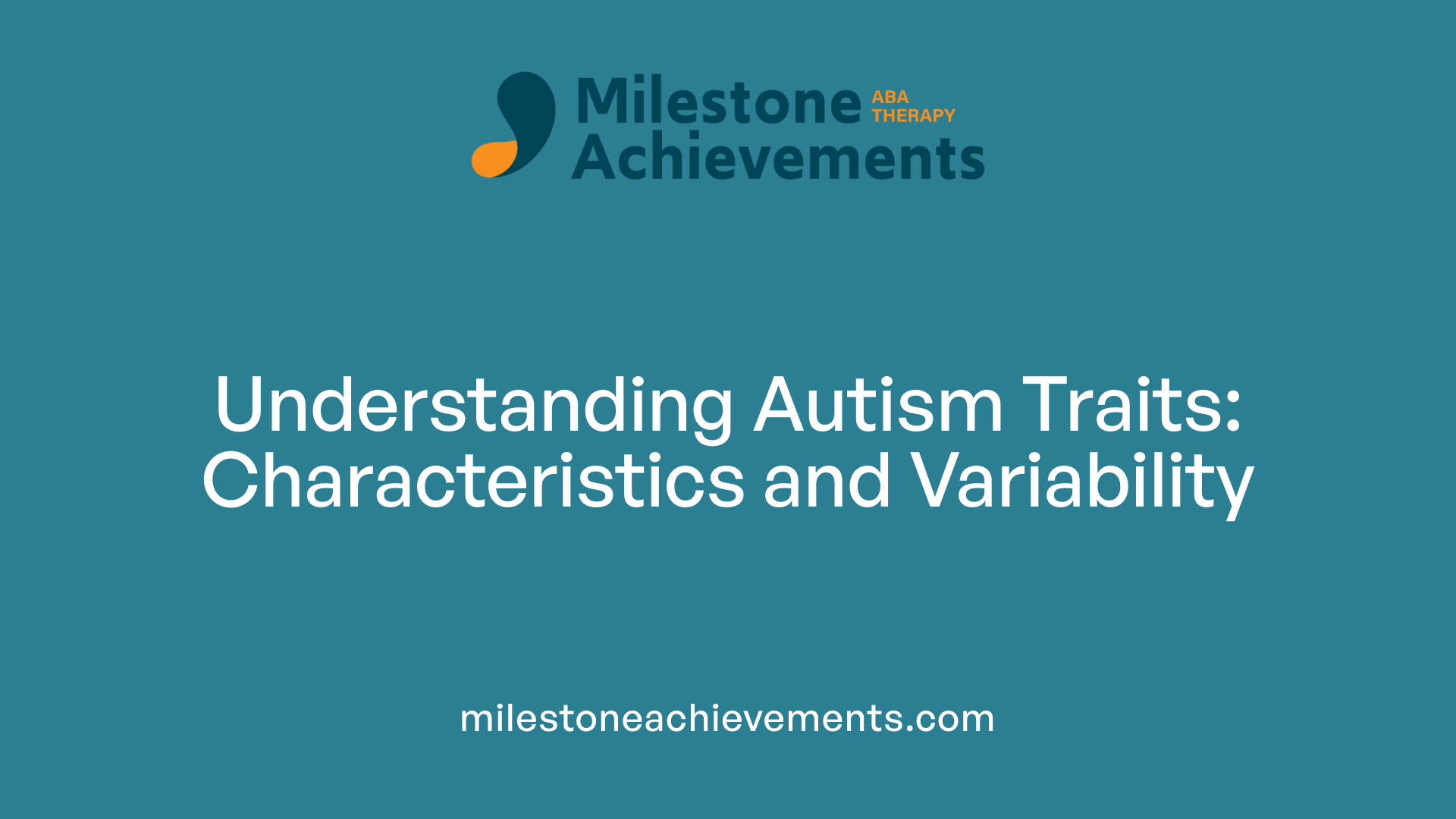Self-Diagnosed Autism
Understanding the Complex Landscape of Self-Diagnosed Autism

Exploring Autonomy and Accuracy in Autism Self-Identification
As awareness of autism spectrum disorder (ASD) grows, so does the phenomenon of self-diagnosis. Many individuals, faced with barriers such as long wait times, high costs, and systemic disparities, turn to online resources and community support to understand their neurodiversity. This article delves into the nuances of self-diagnosed autism, examining its scientific validity, societal implications, and the critical role of professional assessment, all while navigating the rich and complex spectrum of autistic traits.
Autism Spectrum Disorder: Symptoms and Traits

What are the characteristics of autism spectrum disorder (ASD) including social communication challenges, repetitive behaviors, sensory sensitivities, and routines?
Autism spectrum disorder (ASD) is characterized by a range of observable traits that vary widely among individuals. Common features include difficulties in social communication, such as challenges in understanding or using verbal and non-verbal cues, making small talk, and interpreting social situations. Many autistic people experience repetitive behaviors and routines, often finding comfort and stability in predictable patterns. Sensory sensitivities are also typical, with heightened or reduced responses to stimuli like sounds, lights, textures, and smells.
Additionally, individuals may show intense interests and strong preferences for routines, which can provide a sense of control and reduce anxiety. Some traits include monotone speech, literal interpretation of language, and difficulty with emotional regulation. These characteristics reflect a complex and diverse neurotype among people on the spectrum.
How does the presentation of ASD traits differ across individuals and ages?
Traits of ASD can manifest differently depending on factors such as age, gender, and individual differences. In childhood, signs may include delays in speech development, unusual play patterns, or difficulties with peer interactions. In adulthood, traits can become more subtle, such as challenges with social nuances, emotional regulation, or sensory overload.
Research shows that adults may notice traits like a preference for routines, intense interests, or sensory sensitivities, but might have learned to mask behaviors in social settings. The variability highlights that autism is not a one-size-fits-all diagnosis but a spectrum with many possible expressions.
What are the early signs of autism in childhood and how can traits be recognized in adulthood?
Early signs of autism often appear within the first two years of life. These may include a lack of eye contact, delayed speech or language skills, limited gestures, and difficulties in engaging with peers or caregivers. Some children may exhibit repetitive movements or show very focused interests.
In adulthood, recognizing ASD traits involves observing ongoing patterns such as challenges in social interactions, preference for routines, sensory sensitivities, or intense interests. Adults might also notice difficulties with subtle social cues, emotional regulation, or literal thinking. Many grown-up autistic individuals find that self-awareness and community connections help them identify traits they may have previously overlooked.
Understanding these signs is essential for timely support, and professional assessment can confirm diagnosis, helping individuals access resources tailored to their needs.
What does current research say about the heritability of autism?
Current research indicates that autism spectrum disorder (ASD) has a high heritability estimate, ranging between 70% and 90%, based on twin studies and genetic analyses. Genetics play a major role, with an estimated 200 to 1,000 genes involved in autism susceptibility, including both inherited and de novo mutations. Many genetic factors have been identified, such as specific gene mutations, copy number variants, and chromosomal alterations, which are associated with ASD across diverse populations.
Advances in genetic testing techniques, like whole exome sequencing, have facilitated the discovery of numerous risk genes and pathways involved in ASD, including chromatin remodeling, signaling pathways, and neurodevelopmental processes. While genetics are predominant, environmental factors also influence autism risk, but there is no scientific evidence linking vaccines to autism.
What resources are available for self-assessment and exploring neurodiversity?
There are many online tools and organizations dedicated to helping individuals explore autism traits and neurodiversity. Screening instruments like the Autism Spectrum Quotient (AQ) Test, RAADS–Revised, and the Aspie Quiz can provide initial insights and guidance on whether further assessment is recommended.
Educational resources from groups like the Autistic Self Advocacy Network (ASAN) and Milestones Autism Resources offer valuable information about autism traits, self-understanding, and community support. Connecting with autistic communities, both online and local, can provide peer support and shared experiences, often without needing a formal diagnosis.
For those seeking a formal diagnosis, professional assessments conducted by psychologists or psychiatrists utilize developmental history, behavioral observation, and specific diagnostic tools. Local autism agencies can assist in finding qualified evaluators.
These resources highlight that exploring neurodiversity can be a meaningful first step in understanding oneself. While formal diagnosis can open doors to supports and accommodations, self-assessment and community engagement play an important role in personal insight.
How common is self-diagnosis of autism?
Self-diagnosis has become increasingly common, especially among adults who face barriers accessing formal assessments. A study involving over 1,000 adults in the U.S. found that around one-third of people identifying as autistic may be self-diagnosed, influenced heavily by information from social media and online communities.
Research indicates that self-diagnosed individuals tend to exhibit similar traits and report comparable levels of stigma and impact on quality of life as those with clinically confirmed diagnoses. Factors such as gender, age, and employment status influence self-diagnosis rates, with women and older adults more likely to identify themselves as autistic.
While self-diagnosis can promote understanding and community belonging, it underscores the importance of professional evaluations for accurate diagnosis and to address co-occurring conditions like anxiety and depression.
What steps should I take after suspecting I might be autistic?
If you suspect you might be autistic, your first step should be to educate yourself about ASD traits and resources. Reading reputable materials, engaging with online communities, and reflecting on your experiences can clarify your understanding.
Scheduling an appointment with a healthcare professional—such as a psychologist, psychiatrist, or your primary care doctor—is vital for a formal assessment. Discuss your concerns openly, and consider seeking a comprehensive evaluation using standardized diagnostic tools.
While waiting for the assessment, connecting with autistic support groups can provide emotional support and practical guidance. Remember that self-awareness, patience, and professional guidance are crucial to navigating this process.
Why is a professional assessment important for diagnosing autism?
A professional assessment ensures an accurate diagnosis based on standardized criteria, including developmental history, behavior, and social interaction patterns. This comprehensive process helps differentiate autism from other conditions with similar traits.
Having an official diagnosis facilitates access to tailored interventions, therapies, and accommodations. It can also foster community connection, promote self-acceptance, and guide planning for educational, employment, and healthcare needs.
Overall, a formal assessment provides validation and personalized support, leading to better outcomes and quality of life.
Is autism self-diagnosis valid?
Self-diagnosis can be valid in terms of personal identity and understanding, especially when individuals engage in thorough research and community validation. Studies show that self-diagnosed adults display traits similar to those with clinical diagnoses, supporting the reliability of self-assessment.
However, it is important to recognize that a clinical diagnosis from qualified professionals offers essential benefits, including access to services and legal protections. While self-diagnosis is meaningful for self-awareness, it should ideally be complemented by professional assessment.
What is the scientific consensus on self-diagnosed autism?
The scientific community acknowledges that while an official diagnosis remains the gold standard, self-diagnosis is increasingly recognized as a valid and meaningful step for many individuals, especially considering barriers to formal assessment. Research indicates that self-diagnosed individuals often exhibit similar traits and challenges as diagnosed individuals. Many organizations accept self-diagnosis for advocacy and community participation, emphasizing that personal understanding is valid even without formal certification.
How does social media impact perceptions of self-diagnosed autism?
Social media platforms greatly influence perceptions of autism, often spreading both accurate information and misinformation. Platforms like TikTok and YouTube provide spaces for self-expression, community building, and awareness-raising.
However, many videos contain oversimplified, exaggerated, or inaccurate portrayals of autism, which can mislead viewers. An analysis of popular TikTok videos found that only about a quarter contained correct information, while many were overly generalized or outright false. This misinformation can lead to misdiagnoses, delayed professional assessment, or inappropriate self-labeling.
While social media fosters acceptance and understanding, viewers are encouraged to critically evaluate content and seek professional advice for accurate diagnosis and support. Balancing online engagement with credible sources and professional guidance is essential for a nuanced view of autism and neurodiversity.
The Benefits and Limitations of Self-Identification

Why do people self-identify as autistic?
Many individuals find self-identification with autism to be a meaningful process that fosters understanding and community connection. People often turn to self-diagnosis after extensive personal research, reading, and engaging with online communities where shared experiences help validate their feelings and behaviors. For some, feeling different or struggling socially, cognitively, or sensory-wise aligns with traits typical of autism, prompting reflection and exploration. Personal validation and the desire to belong to a neurodiverse community often motivate individuals to adopt an autistic identity, especially when traditional pathways to diagnosis are hindered by barriers such as cost, long wait times, or systemic biases.
Many people recognize traits like difficulty with social cues, sensory sensitivities, or intense interests and interpret these as signs of being on the autism spectrum. Self-identification can be an empowering step toward accepting oneself, reducing shame, and understanding that challenges are not personal failures but variations of neurodiversity. It also provides a sense of community belonging, which is crucial for mental health and well-being.
What are the drawbacks of self-diagnosis?
Despite its personal significance, self-diagnosis comes with notable limitations and risks. Without a professional assessment, there is a chance of misinterpreting symptoms, leading to incorrect conclusions about one’s neurotype. Inaccurate self-diagnosis can result in missed diagnoses of other co-occurring conditions such as anxiety or depression, which require specific treatment.
Moreover, self-diagnosis does not grant access to certain supports, legal protections, or accommodations that are available through formal diagnosis. For example, disability benefits, educational supports, and workplace accommodations often depend on official medical documentation.
Barriers like high testing costs—ranging from $1500 to $3000 in the US—long wait times, and systemic biases, especially affecting Black, Latinx, and non-cisgender populations, further complicate formal assessment access. Some individuals may also face societal stigma or discrimination if their diagnosed status becomes part of their medical records, potentially affecting employment or other areas of life.
How does self-awareness influence mental health and community belonging?
Self-knowledge about one's neurodiversity can greatly improve mental health. Many individuals report feeling more authentic, validated, and less ashamed when they acknowledge their experiences as part of a neurodiverse identity. Recognizing oneself as autistic often enhances self-acceptance, diminishes internalized stigma, and fosters resilience.
Participation in community forums and online groups offers peer support, shared understanding, and a collective voice that can amplify advocacy efforts. These communities provide safe spaces for expressing difficulties, sharing resources, and celebrating neurodiversity.
Conversely, without formal support, some may overlook or dismiss co-occurring mental health conditions. It is also possible that unsupported self-diagnosis could lead to social misunderstandings or misrepresentation, affecting how others perceive autism.
Should self-diagnosis be considered valid?
Self-diagnosis can be regarded as valid from a personal and community perspective. Studies show that many self-identified individuals exhibit traits and challenges similar to clinically diagnosed groups. The Autism Spectrum Identity Scale (ASIS), for instance, has demonstrated consistent factor structures between diagnosed and self-diagnosed adults, indicating shared underlying traits.
Research from the Drexel University Autism Institute highlights that a significant proportion of self-diagnosed adults have similar self-concept, stigma levels, and quality of life as those with formal diagnoses. These findings suggest that self-identification often reflects genuine experiences of neurodiversity.
However, clinical validation remains important for accessing formal supports and legal protections. Self-diagnosis should ideally be approached with thorough research, reflection, and, when possible, professional consultation to ensure accuracy.
What role do psychological factors play?
Psychological motivations such as the desire for self-understanding, validation, and community acceptance drive many people to self-identify with autism. Difficulties in social interactions, sensory sensitivities, and communication challenges resonate deeply with autism traits learned through research and community engagement.
Societal stigma or dismissiveness from healthcare providers can reinforce the drive toward self-identification as a form of empowerment. For some, it becomes a way of asserting their identity and seeking validation outside traditional clinical pathways. Personal reflection and observation of one's behaviors often foster a sense of authenticity and help individuals interpret their experiences through a neurodiverse lens.
How does self-identification affect well-being?
Self-identification can significantly impact mental health positively by promoting self-acceptance. When rooted in credible research and community acknowledgment, recognizing oneself as autistic often alleviates shame and internalized stigma. It cultivates a sense of belonging, especially when engaging with neurodiverse communities that affirm individual differences.
Participation in these communities offers emotional support, enhances self-esteem, and fosters advocacy. It can motivate individuals to seek further assessment or support if needed.
Nevertheless, self-diagnosed individuals should remain mindful of the importance of comprehensive evaluations, particularly for managing co-occurring conditions like anxiety or depression. Integrating self-knowledge with professional guidance often results in better outcomes.
What ethical considerations surround self-diagnosis?
Autonomy and personal validation are central to self-diagnosis, but ethical concerns arise about potential misdiagnosis and the consequences thereof. While self-identification empowers individuals, it may also lead to inaccuracies, affecting the support they receive and community integrity.
Formal diagnoses confer legal protections and access to tailored interventions, but they are subject to systemic biases and barriers. Balancing these aspects involves respecting individual agency while promoting accurate understanding through credible sources and professional validation whenever possible.
In conclusion, self-identification with autism offers personal validation, strengthens community bonds, and promotes awareness. However, it is most effective and ethically sound when paired with professional evaluation, ensuring individuals receive appropriate support and recognition.
Navigating the Path Forward
While self-diagnosed autism plays a significant role in fostering personal understanding and community connection, it remains essential to pursue professional assessment for comprehensive support and validation. Recognizing the benefits and limitations of self-identification encourages a balanced approach—valuing personal resonance and community validation while advocating for accessible, accurate diagnostic pathways. As awareness continues to grow, so does the importance of accurate information, critical engagement with social media, and respectful recognition of diverse neurotypes.
References
- Autism Self-Diagnosis: Can You Diagnose Yourself With Autism?
- Wondering if you're Autistic? - CHOP Research Institute
- As an Autistic Psychologist, Here Are My Thoughts on Autism and ...
- Structural Validation of the Autism Spectrum Identity Scale and ...
- Autism screening
- Self-Diagnosed Autism: Is It a Valid Diagnosis?
- I Am Questioning My Identity - Reframing Autism
- Autism: TikTok Leading People to Inaccurate Self-Diagnosis
- Pros and cons of getting an autism diagnosis as an adult







